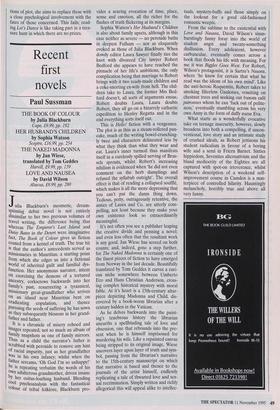Recent first novels
Paul Sussman
THE BOOK OF COLOUR by Julia Blackburn Cape, £9.99, pp. 192 HER HUSBAND'S CHILDREN by Sophia Watson Sceptre, £16.99, pp. 254 THE NAKED MADONNA by Jan Wiese, translated by Tom Geddes Handl, £9.99, pp. 159 LOVE AND NAUSEA by David Wilson Abacus, f9.99, pp. 280 Julia Blackburn's mesmeric, dream- spinning debut novel is not entirely dissimilar to her two previous volumes of travel writing, the difference being that whereas The Emperor's Last Island and Daisy Bates in the Desert were imaginative fact, The Book of Colour gives us fiction coaxed from a kernel of truth. The true bit is that the author's antecedents served as missionaries in Mauritius, a starting point from which she edges us into a fictional world of inherited guilt and familial dys- function. Her anonymous narrator, intent on exorcising the demons of a tortured ancestry, corkscrews backwards into her family's past, resurrecting a tyrannical, missionary great-grandfather who arrives on an island near Mauritius bent on eradicating copulation, and thence pursuing the seeds of suffering he has sown as they subsequently blossom in her grand- father and father.
It is a chronicle of misery echoed and images repeated, not so much an album of family snapshots as one of family mirrors. Thus as a child the narrator's father is scrubbed with peroxide to remove any hint of racial impurity, just as her grandfather was in his own infancy; whilst when the father screams, 'Oh God I'm so unhappy!' he is repeating verbatim the words of his own adulterous grandmother, driven insane by her coitus-loathing husband. Blending Cool psychoanalysis with the fantastical Colour of tribal folklore, Blackburn pro- vides a searing evocation of time, place, sense and emotion, all the richer for the flashes of truth flickering at its margins.
Sophia Watson's Her Husband's Children is also about family upsets, although in this case neither as severe — no peroxide baths in deepest Fulham — nor as eloquently evoked as those of Julia Blackburn. When dowdy editor Laura Sawyer finally ties the knot with divorced City lawyer Robert Bedford she appears to have reached the pinnacle of her life's ambitions, the only complication being that marriage to Robert brings with it two ready-made children and a coke-snorting ex-wife from hell. The chil- dren take to Laura, the former Mrs Bed- ford doesn't, all sorts of arguments ensue, Robert doubts Laura, Laura doubts Robert, they all go on a bizarrely cathartic expedition to Henley Regatta and in the end everything sorts itself out. This is Hello! fiction with a vengeance. The plot is as thin as a steam-rollered pan- cake, much of the writing bowel-crunching- ly twee and characters delineated less by what they think than what they wear and eat. Laura's inner turmoil thus manifests itself in a carelessly spilled serving of Brus- sels sprouts, whilst Robert's increasing nihilism is evidenced when 'he did not even comment on the herb dumplings and refused the syllabub outright'. The overall effect is that of reading a collapsed soufflé, which makes it all the more depressing that you can't put the damn thing down. Tedious, petty, outrageously retentive, the antics of Laura and Co. are utterly com- pelling, not least because they make your own existence look so extraordinarily meaningful.
It's not often you see a publisher leaping the creative divide and penning a novel; and even less often that the resultant work is any good. Jan Wiese has scored on both counts; and, indeed, gone a step further, for The Naked Madonna is certainly one of the finest pieces of fiction to have emerged from Norway in the last decade. Beautifully translated by Tom Geddes it carves a curi- ous niche somewhere between Umberto Eco and Hans Christian Anderson, cross- ing complex historical mystery with moral fable. At it's heart is a 15th-century altar- piece depicting Madonna and Child, dis- covered by a book-worm librarian after a century hidden in the Vatican.
As he delves backwards into the paint- ing's tenebrous history the librarian unearths a spellbinding tale of love and obsession, one that rebounds into the pre- sent when he is himself imprisoned for murdering his wife. Like a repainted canvas being stripped to its original image, Wiese uncovers layer upon layer of truth and sym- bol, passing from the librarian's narrative to the 15th-century manuscript on which that narrative is based and thence to the journals of the artist himself, endlessly replicating a tale of thwarted love and sex- ual recrimination. Simply written and richly allegorical this will appeal alike to intellec- tuals, mystery-buffs and those simply on the lookout for a good old-fashioned romantic weepie.
From the sublime to the existential with Love and Nausea, David Wilson's sinus- burstingly funny foray into the world of student angst and twenty-something disillusion. Every adolescent, however carbuncular, eventually comes across a book that floods his life with meaning. For me it was Biggles Goes West. For Robert, Wilson's protagonist, it is Sartre's Nausea, where 'he knew for certain that what he read was the idiom of his own mind'. Like the anti-heroic Roquentin, Robert takes to smoking filterless Gauloises, vomiting on chestnut trees and seeking out buxom café patronnes whom he can 'fuck out of polite- ness,' eventually stumbling across his very own Anny in the form of daffy nurse Eva.
What starts as a wonderfully evocative take on teenage insecurity, however, slowly broadens into both a compelling, if uncon- ventional, love story and an intimate study of crushed ideals, as Robert jettisons his student radicalism in favour of a boring wife and a semi in Friem Barnet. Sixties hippiedom, Seventies alternativism and the bland mediocrity of the Eighties are all captured with spot-on irreverence, whilst Wilson's description of a weekend self- improvement course in Camden is a mas- terpiece of controlled hilarity. Hauntingly melancholy, horribly true and above all very funny.


















































































 Previous page
Previous page